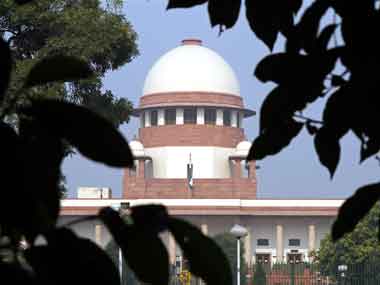If the judges of the Constitutional bench that struck down the National Judicial Appointments Commission (NJAC) are so certain about the correctness of their verdict, they should read the scathing opinions of two of our brightest legal minds: Arun Jaitley of the BJP, the finance minister, and Abhishek Manu Singhvi of the Congress, whose party though is more inclined to make political capital out of the government’s discomfiture than stand up for what is right. Jaitley, writing in his blog, was unsparing in his criticism of the judgment which essentially rejects a law passed nearly unanimously by Parliament and 20 legislatures. The Supreme Court has thus overruled the will of the people. [caption id=“attachment_2388196” align=“alignleft” width=“380”]
 Supreme Court of India. Reuters[/caption] Terming the verdict as “the tyranny of the unelected”, Jaitley wrote: “A Constitutional court, while interpreting the Constitution, had to base its judgment on Constitutional principles. There is no Constitutional principle which lays down that Indian democracy has to be saved from elected representatives.” But Singhvi’s article in The Times of India today (19 October) is simply outstanding. Since he has shown additional courage by taking a stand that is different from that of his party, he deserves special appreciation. Singhvi was brilliant in his excoriation of the Supreme Court. Two passages are worth quoting in detail for they bring home the gravity of the Supreme Court’s horrendous mistake in rejecting the NJAC and restoring the collegium system of judges appointing themselves without an iota of legality behind them - except the fig leaf argument of “judicial independence”. Wrote Singhvi: “All teleological and purposive acrobatics cannot convert the simple and unambiguous words of our constitution (“The President shall appoint… After consultations) in articles 124-217 to mean that the President (ie, central government) cannot appoint and that only the five senior-most apex court judges can do so. Even Alice in Wonderland could not take so much liberty with the English language.” Touche! Singhvi drove the knife deeper in with a devastatingly simple argument: not a single line in the constitution, of the debates that preceded its writing, he said, “sanctifies judicial self-procreation”. He minced no words in calling the verdict “grievously wrong”, “constitutionally erroneous” and a “naked usurpation of legislative power.” Singhvi’s argument takes all legitimacy away from the judgment precisely because it has no political content in it. It is purely a legal view. One only hopes his party does not now gag him since it has taken an unprincipled stand on the NJAC. This single article of Singhvi makes me doff my hat to him in admiration. He has spoken the truth as he sees it and it is important to show the mirror to the Supreme Court in this flawed verdict.
Supreme Court of India. Reuters[/caption] Terming the verdict as “the tyranny of the unelected”, Jaitley wrote: “A Constitutional court, while interpreting the Constitution, had to base its judgment on Constitutional principles. There is no Constitutional principle which lays down that Indian democracy has to be saved from elected representatives.” But Singhvi’s article in The Times of India today (19 October) is simply outstanding. Since he has shown additional courage by taking a stand that is different from that of his party, he deserves special appreciation. Singhvi was brilliant in his excoriation of the Supreme Court. Two passages are worth quoting in detail for they bring home the gravity of the Supreme Court’s horrendous mistake in rejecting the NJAC and restoring the collegium system of judges appointing themselves without an iota of legality behind them - except the fig leaf argument of “judicial independence”. Wrote Singhvi: “All teleological and purposive acrobatics cannot convert the simple and unambiguous words of our constitution (“The President shall appoint… After consultations) in articles 124-217 to mean that the President (ie, central government) cannot appoint and that only the five senior-most apex court judges can do so. Even Alice in Wonderland could not take so much liberty with the English language.” Touche! Singhvi drove the knife deeper in with a devastatingly simple argument: not a single line in the constitution, of the debates that preceded its writing, he said, “sanctifies judicial self-procreation”. He minced no words in calling the verdict “grievously wrong”, “constitutionally erroneous” and a “naked usurpation of legislative power.” Singhvi’s argument takes all legitimacy away from the judgment precisely because it has no political content in it. It is purely a legal view. One only hopes his party does not now gag him since it has taken an unprincipled stand on the NJAC. This single article of Singhvi makes me doff my hat to him in admiration. He has spoken the truth as he sees it and it is important to show the mirror to the Supreme Court in this flawed verdict.
NJAC: Singhvi, Jaitley hold mirror to Supreme Court, and the picture isn't pretty
R Jagannathan
• October 19, 2015, 13:32:31 IST
If the judges of the Constitutional bench that struck down the National Judicial Appointments Commission (NJAC) are so certain about the correctness of their verdict, they should read the scathing opinions of two of our brightest legal minds: Arun Jaitley of the BJP, the finance minister, and Abhishek Manu Singhvi of the Congress,
Advertisement
)